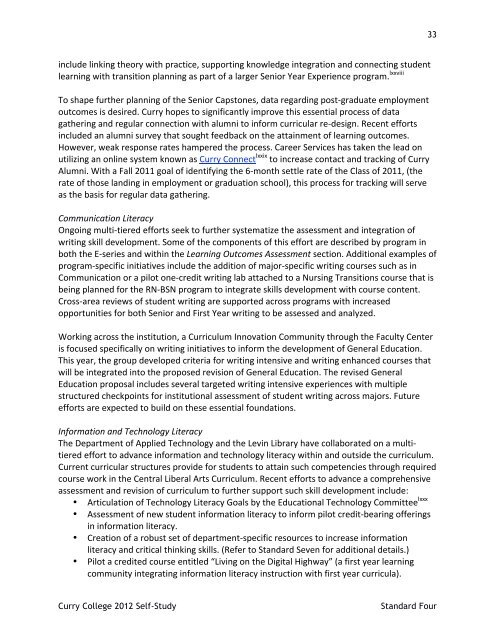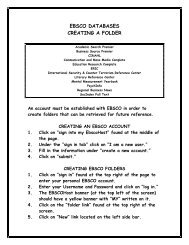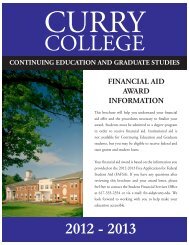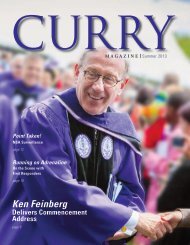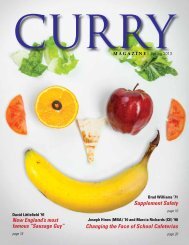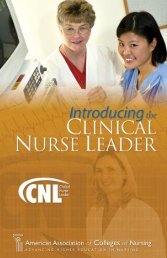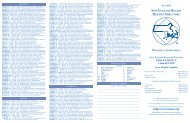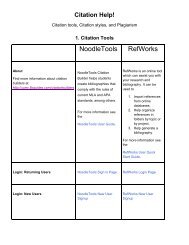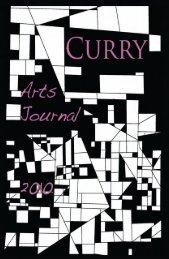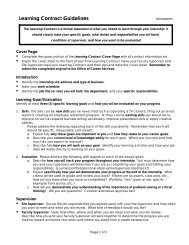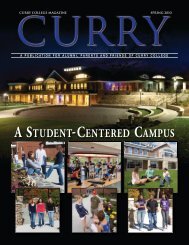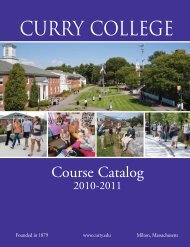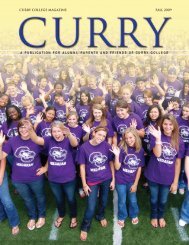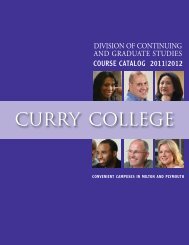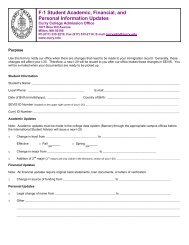Read the Curry College NEASC 2012 Self-Study Report.
Read the Curry College NEASC 2012 Self-Study Report.
Read the Curry College NEASC 2012 Self-Study Report.
You also want an ePaper? Increase the reach of your titles
YUMPU automatically turns print PDFs into web optimized ePapers that Google loves.
33<br />
include linking <strong>the</strong>ory with practice, supporting knowledge integration and connecting student<br />
learning with transition planning as part of a larger Senior Year Experience program. lxxviii<br />
To shape fur<strong>the</strong>r planning of <strong>the</strong> Senior Capstones, data regarding post‐graduate employment<br />
outcomes is desired. <strong>Curry</strong> hopes to significantly improve this essential process of data<br />
ga<strong>the</strong>ring and regular connection with alumni to inform curricular re‐design. Recent efforts<br />
included an alumni survey that sought feedback on <strong>the</strong> attainment of learning outcomes.<br />
However, weak response rates hampered <strong>the</strong> process. Career Services has taken <strong>the</strong> lead on<br />
utilizing an online system known as <strong>Curry</strong> Connect lxxix to increase contact and tracking of <strong>Curry</strong><br />
Alumni. With a Fall 2011 goal of identifying <strong>the</strong> 6‐month settle rate of <strong>the</strong> Class of 2011, (<strong>the</strong><br />
rate of those landing in employment or graduation school), this process for tracking will serve<br />
as <strong>the</strong> basis for regular data ga<strong>the</strong>ring.<br />
Communication Literacy<br />
Ongoing multi‐tiered efforts seek to fur<strong>the</strong>r systematize <strong>the</strong> assessment and integration of<br />
writing skill development. Some of <strong>the</strong> components of this effort are described by program in<br />
both <strong>the</strong> E‐series and within <strong>the</strong> Learning Outcomes Assessment section. Additional examples of<br />
program‐specific initiatives include <strong>the</strong> addition of major‐specific writing courses such as in<br />
Communication or a pilot one‐credit writing lab attached to a Nursing Transitions course that is<br />
being planned for <strong>the</strong> RN‐BSN program to integrate skills development with course content.<br />
Cross‐area reviews of student writing are supported across programs with increased<br />
opportunities for both Senior and First Year writing to be assessed and analyzed.<br />
Working across <strong>the</strong> institution, a Curriculum Innovation Community through <strong>the</strong> Faculty Center<br />
is focused specifically on writing initiatives to inform <strong>the</strong> development of General Education.<br />
This year, <strong>the</strong> group developed criteria for writing intensive and writing enhanced courses that<br />
will be integrated into <strong>the</strong> proposed revision of General Education. The revised General<br />
Education proposal includes several targeted writing intensive experiences with multiple<br />
structured checkpoints for institutional assessment of student writing across majors. Future<br />
efforts are expected to build on <strong>the</strong>se essential foundations.<br />
Information and Technology Literacy<br />
The Department of Applied Technology and <strong>the</strong> Levin Library have collaborated on a multitiered<br />
effort to advance information and technology literacy within and outside <strong>the</strong> curriculum.<br />
Current curricular structures provide for students to attain such competencies through required<br />
course work in <strong>the</strong> Central Liberal Arts Curriculum. Recent efforts to advance a comprehensive<br />
assessment and revision of curriculum to fur<strong>the</strong>r support such skill development include:<br />
• Articulation of Technology Literacy Goals by <strong>the</strong> Educational Technology Committee lxxx<br />
• Assessment of new student information literacy to inform pilot credit‐bearing offerings<br />
in information literacy.<br />
• Creation of a robust set of department‐specific resources to increase information<br />
literacy and critical thinking skills. (Refer to Standard Seven for additional details.)<br />
• Pilot a credited course entitled “Living on <strong>the</strong> Digital Highway” (a first year learning<br />
community integrating information literacy instruction with first year curricula).<br />
<strong>Curry</strong> <strong>College</strong> <strong>2012</strong> <strong>Self</strong>-<strong>Study</strong><br />
Standard Four


